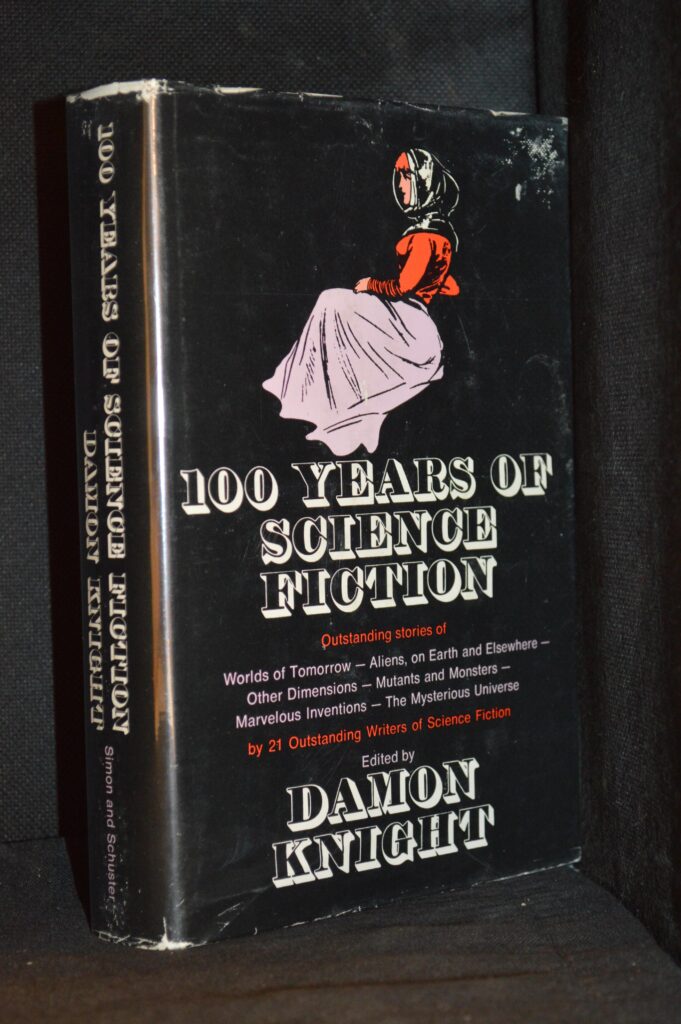
Featuring one of the most lackluster covers in Science Fiction history, Damon Knight’s One Hundred Years of Science Fiction (1968) manages to redeem itself with some wonderful stories.
Back in 1968, Damon Knight was just beginning his career as an editor (while still writing short stories and novels from time to time). These 21 stories hardly accurately represent 100 years of Science Fiction–where are Heinlein, Van Vogt, Edmond Hamilton, Leigh Brackett, and a dozen other major SF writers?
But any anthology that includes Fritz Leiber’s “Sanity” and Theodore Sturgeon’s “The Other Celia” has the Right Idea.
Damon Knight sprinkles in classic stories like “The Ingenious Patriot” by Ambrose Bierce and “With the Night Mail” by Rudyard Kipling. But the focus of this anthology is the 20th Century. My only quibble is that after his “INTRODUCTION” Damon Knight doesn’t introduce the individual stories which would have enhanced the reader’s understanding how and why these particular stories and writers were selected to represent a century of Science Fiction. How many of these stories do you recognize? GRADE: B+
TABLE OF CONTENTS:
| INTRODUCTION by Damon Knight. — 7 | |
| I. WORLDS OF TOMORROW | |
| WITH THE NIGHT MAIL by Rudyard Kipling — 13 |
Mr. Murphy of New York by Thomas McMorrow — 52
New Apples in the Garden by Kris Neville –68
Sanity by Fritz Leiber — 79
II. ALIENTS, ON EARTH AND ELSEWHERE
The Shapes by J. H. Rosny aine — 97
The Other Celia by Theodore Sturgeon — 122
Black Charlie by Gordon R. Dickson — 139
III. OTHER DIMENSIONS
A Subway Named Möbius by A. J. Deutsch — 157
The Man Who Came Early by Poul Anderson — 173
The Other Now by Murray Leinster — 198
IV. MUTANTS AND MONSTERS
Whatever Happened to Corporal Cuckoo? by Gerald Kersh — 213
The Mindworm by C. M. Kornbluth — 238
Nobody Bothers Gus by Algis Budrys- 251
V. MARVELOUS INVENTIONS
The Ingenious Patriot by Ambrose Bierce — 267
The Equalizer by Norman Spinrad — 269
Splice of Life by Sonya Dorman — 278
Business As Usual, During Alterations by Ralph Williams — 285
VI. THE MYSTERIOUS UNIVERSE
The Man Who Could Work Miracles by H. G. Wells — 311
The Quest for St. Aquin by Anthony Boucher — 327
The Nine Billion Names of God by Arthur C. Clarke — 345
The Voices of Time by J. G. Ballard — 352
Knight began his pro editing career in the 1950s–the first issue of his first magazine, WORLDS BEYOND, appeared in ’50. His first hardcover anthology I’m aware of was published in ’62.
There is a lack of true “chestnuts” in this century survey, and I suspect that was intentional…I think he was seeking to present others, scattershot through the previous century, that still represented the range of sf…a few at least verge on stories widely anthologized already, but most overlooked. I recognize most but not all. (I’ve never read too heavily in Gernsbackian sf, for example). But, yes, whoever designed that cover presumably was either Trying their best, or demonstrating their contempt…the spot illo is about all I’d consider keeping (even if I put it on the back cover rather than the front).
Also, Algis Budrys’s byline is typo’d above…albeit his given name was actually Algirdas, which is why he signed “Algis” instead. I forget who, possibly Knight, noted that Lithuanian is a thorny language.
Todd, thanks for the heads up. Once again, I’m blaming the WORDPRESS spell checker.
Todd, I agree completely with your analysis of ONE HUNDRED YEARS OF SCIENCE FICTION. Damon Knight would go on to edit much better anthologies.
How many? Not many. A few. Bierce, Clarke, Wells, Boucher, Kersh, possibly others.
Jeff, ONE HUNDRED YEARS OF SCIENCE FICTION is really a mixed bag.
Damon Knight anthologies were some of the earliest science books I bought as a kid so I have a soft spot for him but yeah, that’s not just a lousy cover but a really dumb joke. I recognize a few stories; the Clarke of course, which was seemingly everywhere for a couple of decades, and the Kipling, which is a fascinating relic that he later followed up with a sequel. Grouping the stories by theme seems like a gimmicky call.
Bryon, Groff Conklin, another major editor of anthologies, used to group stories by themes so other editors copied that method.
Or were asked to do so. A shallow book editor can have All Sorts of Ideas.
Which is to say, the publisher’s editor, rather than the anthology’s editor.
While not my faorite anthologist, Knight’s collections are always worthwhile. especially with his ground-breaking series ORBIT. I have a soft spot in my heart for Knight ever since I learned that he would fling peas with his spoon at fellow guests at conventions. Along with James Blish, he set the standard for science fiction criticism — some of the standards he actually used for his many short stories and his later novels. His nonfiction Book THE FUTURIANS was immensely entertaining, far more so than his bio CHARLES FORT, PROPHET OF THE UNEXPLAINED. And his many contributions to the science fiction filed, per se, were immense.
Jerry, I’m with you on Damon Knight’s criticism chops. The guy knew his stuff! I have Knight’s ORBIT series. He took a lot of risks with some of the stories, but all in all, ORBIT is one of the best SF series of that era.
If I did not already have too many science fiction anthologies to read, I would look for a copy of this one. It has a lot to offer for an inexperienced science fiction reader like me.